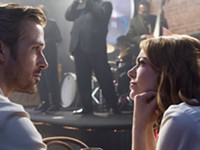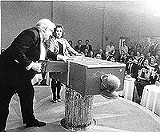[
{
"name": "500x250 Ad",
"insertPoint": "5",
"component": "15667920",
"parentWrapperClass": "",
"requiredCountToDisplay": "1"
}
]
Before going largely unnoticed during its extremely limited theatrical release last August, Songs From the Second Floor was a Jury Prize-winner at Cannes in 2000 and an invitee to Roger Ebert's 2001 Overlooked Film Festival. Floor took Swedish writer/director Roy Andersson four years to complete. (And you thought you waited a long time for Stanley Kubrick to finish Eyes Wide Shut.)
Dark, surreal, depressing, bleak, and based on a poem by Peruvian Communist Caesar Vallejo, Floor is made up of 46 scenes. Some are steeped in Swedish folklore, others in religion, and most damn the current state of our modern capitalist society.
The stories are not all related to one another, though each is set in the same nameless Scandinavian city during what I can only imagine is supposed to be either the eve of the Apocalypse or the end of the Millennium. (Remember Y2K? It was still a real threat back when Andersson came up with the story.)
The main character is Kalle (Lars Nordh), who, as the film opens, has just burned down his own furniture store and spends the following scenes repenting in dust and ashes, like Job. Some of Kalle's many, many problems include being haunted by two ghosts and by his son, a cab-driving poet now living in a mental hospital.
There are other stories, and they're just as deliciously odd. One looks like it could have been an outtake from the Coen brothers' The Hudsucker Proxy, while another features a pile of crucifixes at the local dump. There's even a spot in which a group of subway fares break out into a sing-along opera, a la the "Wise Up" scene from Magnolia.
Toss in the child sacrifice and the parade of slow-moving marchers who flagellate themselves as they weave their way through the traffic jam that has lasted for several days, and you've got a pretty good idea of how unconventional Floor is. It's Samuel Beckett meets Monty Python. Parts of it seem like they were lifted from Terry Gilliam's subconscious, pressed through Kafka's meat grinder and into Buñuel's casings.
And that's just the plot. Think the images in Road To Perdition were carefully constructed? These will knock your socks off, while filling your heart with dread and despair. Floor is (mostly) populated by very unattractive first-time actors who are either deathly thin or morbidly obese, but each is pasty enough to make 2002 Michael Jackson look like 1978 Michael Jackson.
Andersson, who also produces and edits, moves his camera exactly once during the entire film (he might be gun-shy, as this is only his fourth film since A Swedish Love Story won four trophies at the 1970 Berlin Fest). You may be asking, "What about the music?" It's composed by ABBA's Benny Andersson. 'Nuff said.
Floor is probably the kind of film most viewers won't "get" (I know I didn't) but is so enjoyably unusual that following the plot seems unimportant (another recent example of this would be Mulholland Drive). For me, any movie in which a character loudly wonders, "How can you make money with a crucified loser?" when prodded into a career of selling Jesus effigies is one hell of a cinematic experience. Floor will be screened on Saturday, August 3 at the Dryden Theatre.
Henry Bean's impressive directorial debut, The Believer, opens with a scene showing its conflicted central character trailing a young man and then pummeling the snot out of him, simply because he's wearing a yarmulke.
The protagonist, if you feel comfortable calling him that, is 26-year-old Danny Balint (Murder 8y Num8ers' Ryan Gosling), an extremely well-spoken and seemingly well-educated skinhead extremist who appears much brighter than the goofy Nazis he chooses to call friends. Danny, who says the things that he believes everyone else is secretly thinking, hates Jews for very specific reasons, while his cohorts furrow their inbred brows when asked who Eichmann was.
Hating Jews is all Danny ever thinks about, which must be kind of like a latent homosexual yammering non-stop about hating gays (a frat-house epidemic, it seems), because, as it turns out, Danny is (or was) an Orthodox Jew.
We see, through flashbacks, a young, exceedingly nerdy Danny being tossed out of Hebrew school, thanks to his constant questioning of God's authority (calling the Big G a "power-drunk madman" and a "conceited bully"). His unanswered queries have evolved into rage and hatred toward this particular organized religion, and the only lesson he seems to have culled from years of yeshiva studies is that Jews are inherently weak. After all, he reasons, who else would blindly agree to sacrifice a son, like Abraham, or stand by meekly while Nazis execute the person standing next to them?
When Danny falls in with Lina Moebius (Theresa Russell) and Curtis Zampf (Billy Zane), the leaders of an upstart underground fascist movement with big plans, he finds himself drawn closer and closer to his religious roots, kicking off an intense inner battle that grows more intense as his anti-Semitic activities become increasingly militant.
Of course, nobody understands why Danny knows so much about the enemy. They just assume he's really smart and hope to exploit his knowledge to raise money on the Nazi lecture circuit.
In addition to the inner turmoil, Danny also begins a bizarre masochistic relationship (read: mad Aryan love) with Lina's daughter Carla (Summer Phoenix), re-connects with one of his former yeshiva classmates, and becomes the interview subject of a newspaper reporter who has somehow pieced together Danny's religious background and may expose it in a piece he's writing. The Believer, co-scripted by Bean (who has penned shlock like Deep Cover and Internal Affairs) and Mark Jacobson, was partly inspired by the story of Daniel Burros, a Nazi and self-hating Jew who ran into trouble when the New York Times outed him back in the '60s.
Plenty of folks are going to compare The Believer to American History X. It's not quite as good, though Gosling (a former Mickey Mouse Clubber along with Britney and Justin) nearly matches the frightening fury of Ed Norton's eerie performance in that film. There is also likely to be a big chunk of people who dug X but will dislike this picture because there is no final-reel redemption to tie everything up into a neat little package that makes you feel better on the way home from the theater.
In addition to Gosling's mesmerizing performance (which won't be eligible for the Academy Awards because The Believer debuted on pay cable before beginning its theatrical run), Jim Denault's (Our Song) handheld camera work is quite impressive.
The Believer won the Grand Jury Prize at Sundance 2001 and was pegged for a cable premiere on September 30, 2001, but was subsequently pushed back after the 9/11 attacks. (I saw it at the Toronto International Film Festival on September 10, and it did seem a bit less upsetting back then).
Since then, the film has snagged a European Film Award nomination and four Independent Spirit Awards --- two for Bean (Best Screenplay and Best First Feature) and one each for Gosling and Phoenix. Without question, The Believer is a thought-provoking film that will spur discussion and, in some cases, argument. But it's a film that shouldn't be missed, whatever your religious beliefs may be. The Believer opens Friday, August 2 at the Little Theatre.
'Songs from the Second Floor,' 5 and 8 p.m. Saturday, August 3 at the Dryden Theatre, George Eastman House, 900 East Avenue. $5.50; $4.50 members and students. 'The Believer' opens Friday at the Little Theatre, 240 East Avenue. For more of Jon's movie ramblings, visit his site, Planet Sick-Boy www.sick-boy.com, or listen to him on WBER's Friday Morning Show.
Speaking of...
-

Film review: 'Blade Runner 2049'
Oct 10, 2017 -

Film review: 'La La Land'
Dec 30, 2016 -

"The Place Beyond the Pines"
Apr 17, 2013 - More »
Latest in Movie Reviews
More by Jon Popick
-

Good fun in the sun with Shirley
Feb 4, 2004 -

Hollywood’s trying to wink at us
Jan 28, 2004 -

Monster party at the theater
Jan 21, 2004 - More »






